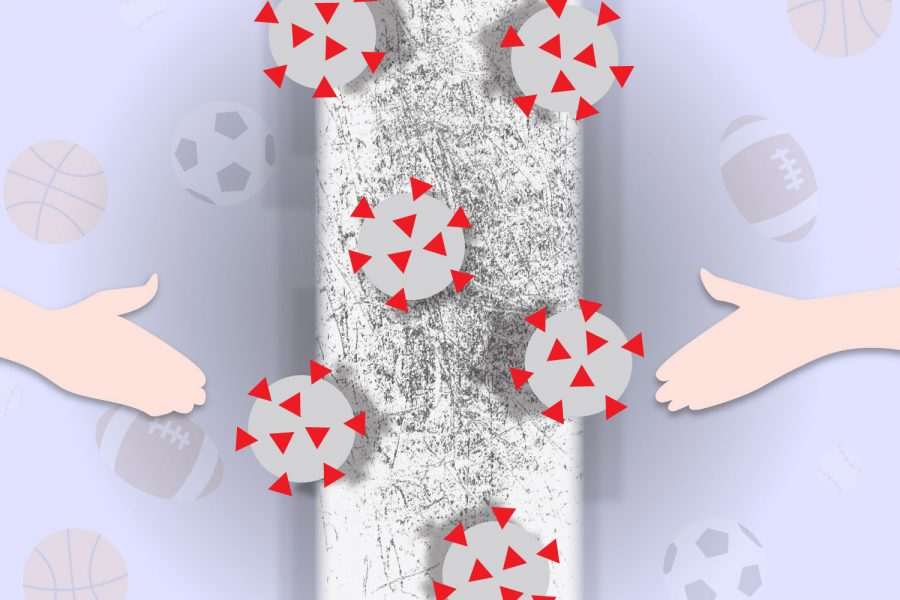Collegiate Recruiting Interrupted Amidst Global Pandemic
The COVID-19 pandemic has caused an unprecedented interruption to collegiate athletic recruitment, wreaking havoc on all divisions and teams that rely on the recruiting process to reload their squads every year.
Due to the health risks that the pandemic currently poses, the NCAA, in addition to canceling all spring sports, has imposed a recruiting “dead period” for all Division I and II collegiate athletic teams. This means that coaches are prohibited from meeting with prospects in person, and prospective recruits cannot visit their schools of interest. However, during this time, coaches can still communicate with potential recruits and current athletes electronically.
Often, collegiate teams’ recruiting plans are largely based on which players they lose from the prior season due to graduation, transfers and athletes pursuing their professional careers.
The ban on in-person recruiting impacts all collegiate athletic programs, especially those who are still attempting to recruit players and finalize their rosters for next year. At Seattle University, all of the athletic teams have been affected by the recruitment shutdown, but both officials within the athletic department and coaches are working to adjust to the new circumstances.
Eric Guerra, the Associate Athletic Director for Student Athlete Services at Seattle U, noted the adjustment many coaches have made amidst the pandemic.
“All coaches have found it difficult in terms of connecting with recruits with all teams under a dead period. We have been doing more virtual tours and implementing more virtual pieces to athletics facilities,” Guerra said. “Coaches have been able to adjust to the new normal. We are working with admissions and coaches on how to adjust strategy while still supporting enrollment goals.”
According to Guerra, the Seattle U athletics department has been able to start signing recruits with letters of intent. One program that recently signed new recruits for next season is the men’s basketball team.
Seattle U Men’s Basketball Coach Jim Hayford explained how his program’s recruiting has been impacted, particularly in light of the imposed dead period.
“It is now more difficult to recruit and develop our relationship with prospects so that they can finish their education and develop as basketball players,” Hayford said.
Despite the fact that recruits cannot currently see campus, Hayford confirmed that “two-thirds of the new teammates had already visited campus and committed.”
Seattle U Women’s Soccer Coach Julie Woodward shared how her program’s recruiting process is impacted by the pandemic. With the 2020 recruiting class for her team already wrapped up with the exception of one recently announced transfer, Woodward focused more on the impact this will have on future recruits. With many high schoolers relying on recreational clubs to get scouted by colleges, the sudden halt in seasons will have the most impact on them.
“It is a hard thing for college coaches and high school athletes as club season, where players get seen, is cancelled this year,” Woodward said.
Recruiting starts early, however, and coaches often keep a lookout for new players early on during their high school play.
“It more affects the collegiate outlook of younger players, but does not have as much impact on seniors who have already signed national letters of intent,” Woodward said. “Regarding these younger players, we have already watched the ones we are interested in as freshman and sophomores in high school.”
While some coaches may find recruiting virtually to be a challenge, Coach Woodward indicated that there’s a bright side to every situation.
“Finding new ways to connect with athletes has been a good thing, whether through giving virtual campus tours or connecting by phone,” she said.
Although recruiting is being affected now in the short-term, Woodward does not think that this pandemic will cause any major changes to collegiate recruiting in the long run.
However, it is likely to have a financial impact. For instance, the NCAA granted a potential extra year of eligibility to spring sport athletes that had their seasons canceled, which could create complications for incoming recruits in terms of allocating scholarship money and potential playing time.
“We are trying to make sure that we give as accurate of a financial picture as possible to families in these hard times so that they can determine what makes sense for them and what doesn’t,” Guerra said.
Although the long-term effects of COVID-19 have yet to be determined as the pandemic continues to wreak havoc on daily life as we know it, one thing is for sure: athletes, coaches and fans are eager to return to their respective sports. And while there is not yet a determined return date, the future of collegiate athletics is hopeful.


